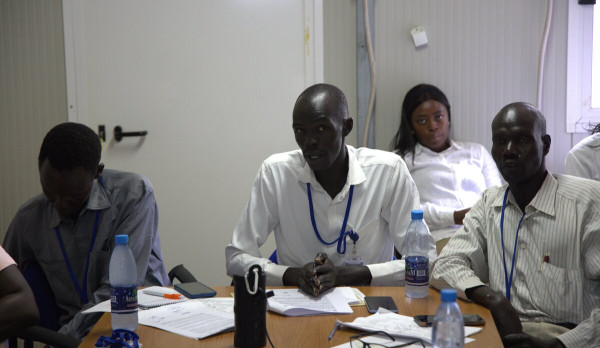
“Where is Angelo?”
It’s been three years since they met, with the last one, without tiring fighting, having rendered Anguei Angelo Madit unrecognizable even to his old friends.
In 2022, during an outbreak of violence around the South Kiir River in Twic County, south of Abyei, a resource-rich border region contested by South Sudan and Sudan, Angelo and his peers were wearing army uniforms and fatigued looks matching them.
Fast-forward to July 2025 and, with the heat-excused exception of the jackets, he and the four young men accompanying him are dressed in suits. More importantly, they are delegates of the Twic Peace Committee, which Angelo helped form in April this year.
“At one point, I just realized that this fight wasn’t ours. I was producing what was hate speech on social media without realizing it, while the people we fought, our brothers, seemed to give us no reason to do so,” he recalls.
Instead, he says, it was a violent battle inherited from his elders, and one that he certainly does not want to pass on to his three children.
Reaching that insight took two years of conflict that claimed hundreds of lives, many of them children, but once Angelo had had his eureka moment, he was quick to forge a new path.
He created a Civil Affairs Department in Twic and connected with Abyei counterparts who shared his vision of peace. Together, they spent many a long night elaborating resolutions and recommendations for a peace proposal.
They shared their draft with the United Nations Mission in South Sudan (UNMISS) and the United Nations Interim Security Force for Abyei (UNISFA), hoping for and receiving their inputs and other technical support.
A revised version of their initial draft is now a witnessed and signed formal document that serves as the basis of their shared, cross-border commitment to overcome their pasts and work together for peace.
So far, the Committee’s collective efforts have yielded rather positive, concrete results, with a significant reduction of violence being key among them. Residents of Abyei will also appreciate the removal of numerous checkpoints in Twic County, making it possible for them to move freely from Juba, Wau and other locations to their home area.
Meanwhile, similarly extensive advocacy by Abyei delegates has greatly facilitated the return of South Sudanese citizens stuck in war-torn Sudan. These days, they can travel through the contested region, using a previously blocked and significantly time-saving passage.
“Arranged peace talks seemed to have little impact, but then you came, the most powerful solution, right from within the center of the conflict. You did this together, setting an example for youth all around South Sudan and, in fact, the world,” said Hiroko Hirahara, Director of the UNMISS Civil Affairs Division, as she addressed the Peace Committees during an online meeting between delegates from both sides.
For the next few months, they are planning joint community rallies, radio collaborations and targeted efforts to bring elders on board the peacebuilding project once initiated by Anguei Angelo Madit. Before going their separate ways, he makes a solemn pledge.
“While we cannot rebuild our tormented past, we can and will do everything in our power to change our common future.”
Distributed by APO Group on behalf of United Nations Mission in South Sudan (UNMISS).


